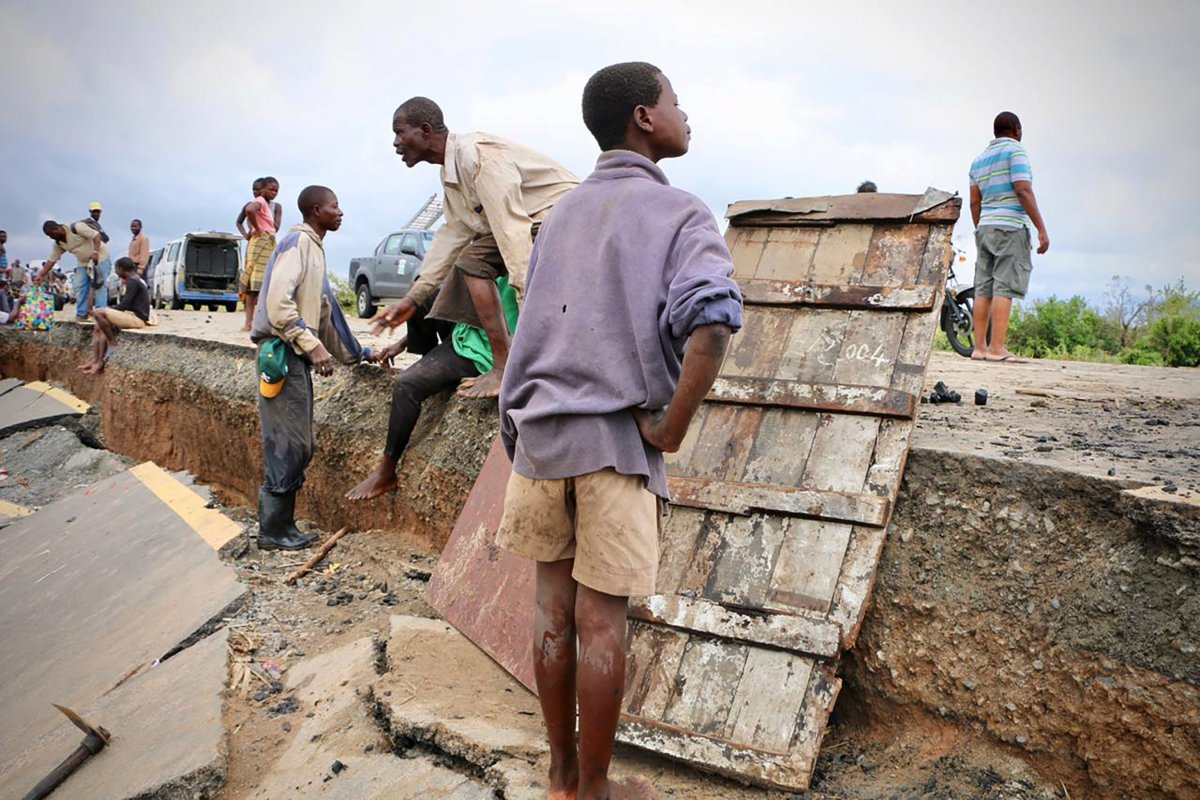Humanitarian groups raced to help hundreds of thousands of people who lost their homes after Cyclone Idai crashed into Mozambique on Thursday.
The storm also struck Malawi and Zimbabw, razing buildings, destroying crops and cutting off key roads and bridges.
Aid workers fear for Beira, a coastal city in Mozambique that's home to more than 500,000 people. Beira was slammed Thursday by what was a Category 2 storm, and the International Federation of Red Cross and Red Crescent Societies reported Monday that 90 percent of the Beira area had been destroyed.
As of Monday, the official death toll across the cities of Beira, Dondo and Chimoio was 84. More than 200 people were thought to have died in Mozambique and Malawi as of Monday morning, NPR reported. At least 2,000 were injured in the two countries, Médecins Sans Frontières (Doctors Without Borders) reported. Zimbabwe experienced extensive damage, and authorities said 98 people had died, according to the BBC.
President Filipe Nyusi warned that the death toll for Mozambique alone could reach 1,000 in the coming days. According to the United Nations, more than 1.5 million people had been affected by the cyclone.
Aid organizations, including Médecins Sans Frontières, International Federation of the Red Cross and Red Crescent Societies, the United Nations International Children's Emergency Fund (UNICEF) and Save the Children, were working hard to deliver aid to those affected by the storm.
Matthew Cochrane, a spokesman for International Federation of the Red Cross and Red Crescent Societies, told Newsweek: "This is the worst disaster in Mozambique's history. Beira has been devastated, and areas surrounding the city have been completely inundated by floodwaters that are, in some places, meters deep… This is a major humanitarian emergency."
UNICEF spokesman Joe English told Newsweek: "We're getting reports of people stranded on the roofs of their buildings, in trees or in other elevated areas. Heavy rains continue across Mozambique. Search and rescue efforts continue, but it's a huge area to cover and there are only limited resources."
People stranded on hilltops and roofs need shelter and clean water, Cochrane explained. But Beira has been "cut off completely by floodwaters." Submerged and damaged roads hamper search and rescue efforts. "The clock is ticking as we know the flood waters will continue to rise," he said
Save the Children was battling to send relief trucks on a treacherous, hours-long journey to the affected area in Mozambique, Greg Ramm, vice president for humanitarian response, told Newsweek. "Access and rising flood waters are currently our biggest hurdles," he said.
Crucial humanitarian supplies were airlifted to areas cut off by the storm and subsequent flooding, English said. Power outages continued across the affected regions, and communication lines had been seriously damaged.
Aid organizations are struggling to keep up with demand for clean water. "We were able to pre-position some supplies—including water purification tablets—but our warehouse was severely damaged in the storm and so much more is needed," English said.
Fearing the potential spread of waterborne diseases, Save the Children's Emergency Health Unit was already working with local authorities and other groups to prevent another wave of catastrophe.
Médecins Sans Frontières spokesperson Brienne Prusak told Newsweek that existing medical facilities in Beira had been severely affected by the storm. "We see massive needs in Beira: The hospital and medical centre where MSF was providing HIV and TB care are only partially functional. Despite being severely damaged, Beira hospital has treated more than 1,500 wounded, which shows how serious this is. All 17 of Beira's health centres lost their roofs."
English said UNICEF had already found more than 260 classrooms and 20 health centers damaged and destroyed in Mozambique. With many areas inaccessible, it's not yet possible to assess the full extent of damage from the storm.
Aid organizations fear further crises could be on the horizon. Prusak said: "Other areas to the north in the Zambezi river basin are on our radar—if the Zambezi breaks its banks and creates extensive flooding, this could be another crisis looming, potentially even bigger than the devastation in Beira."
Whatever happens in the coming days, it's certain the recovery will be lengthy, Cochrane said. "While it can take hours to destroy a community, it can take months or even years to rebuild."
The International Federation of the Red Cross and Red Crescent Societies estimated it needed about $10 million to help the 75,000 people most profoundly affected by the crisis, Cochrane said. "Our priorities are to provide people with shelter and to ensure they have clean water and basic sanitation."
Readers can support the IFRC's work by donating online at https://media.ifrc.org/ifrc/donate/.
Ramm explained that Save the Children would be distributing emergency items such as buckets, tarpaulins, jerricans and multi-purpose tents. "Cash donations are always the best way to help in disasters like this," he said.
Readers can support Save the Children's work in Mozambique, Malawi and Zimbabwe by donating online here.
Readers can also support UNICEF's work in these countries—as well as those affected by other crises—by donating at donate.unicef.org.
Readers can support Médecins Sans Frontières by donating at donate.doctorswithoutborders.org
This article has been updated with comment from Brienne Prusak.

Uncommon Knowledge
Newsweek is committed to challenging conventional wisdom and finding connections in the search for common ground.
Newsweek is committed to challenging conventional wisdom and finding connections in the search for common ground.
About the writer
Katherine Hignett is a reporter based in London. She currently covers current affairs, health and science. Prior to joining Newsweek ... Read more
To read how Newsweek uses AI as a newsroom tool, Click here.








